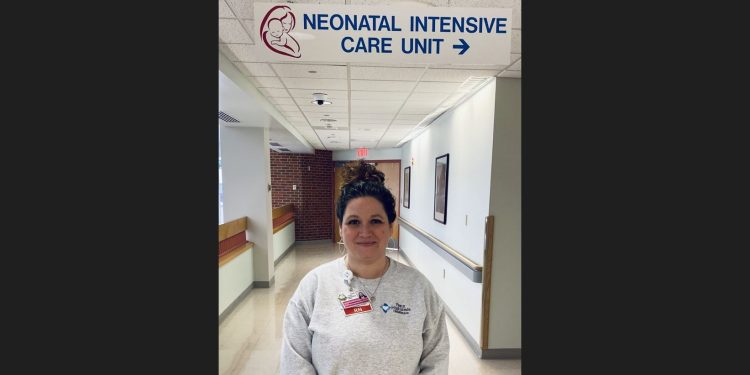DUBOIS – The Maternal and Child Center at Penn Highlands DuBois now has a Substance Use Disorder Care Coordinator Program for Pregnant Women with Substance Use Disorder (SUD).
SUD is a behavioral health disorder that affects the person’s brain and behavior, leading to the inability to control their use of substances.
These substances may be prescribed or not prescribed, obtained on the street, and can include alcohol, opioids and other substances.
Use of illicit drugs, misuse of prescription drugs, ongoing use of prescribed opioids and alcohol during pregnancy can present significant health risks to the mother and baby.
According to the Centers for Disease Control and Prevention, opioid use during pregnancy can result in serious negative health outcomes for the mother and baby including preterm birth, stillbirth, death of the mother during or within one year of the end of pregnancy, and if exposed to opioids Neonatal Opioid Withdrawal Syndrome (NOWS).
NOWS is a group of withdrawal symptoms that most commonly occur in newborns exposed to substances in the womb. Substance Exposed Newborns (SENs) symptoms of withdrawal most often are present within 72 hours of birth.
Some of the more common withdrawal symptoms include tremors or shakes, difficulty consoling, difficulty sleeping, difficulty eating, tight muscle tone and breathing too fast or too slowly.
According to research conducted by the University of Michigan Children’s Hospital and Monroe Carell Jr. Children’s Hospital at Vanderbilt University, there has been a dramatic and disproportional rise in opioid-related complications among rural pregnant women and their infants.
“In Northwestern/Central Pennsylvania, we are definitely seeing an increase in Substance Exposed Newborns (SENs) with the potential to be born with NOWS,” said Shannon Gill, RN, Penn Highlands Healthcare SUD Pregnancy-Postpartum Care coordinator.
“There is such a need for this service in our area,” she added.
Penn Highlands Healthcare Meets the Needs
The Penn Highlands Substance Use Disorder (SUD) Care Coordinator program offers a continuum of care to the mother and baby from pregnancy to postpartum.
Women are referred to the program from their obstetrician’s office, if they are admitted to a substance abuse program following a positive drug screen or through community referrals including Drug and Alcohol.
“I help bridge the gap between the mother and the services she needs in order to have a healthy pregnancy,” explained Shannon.
“My role is to link the mother to sources of education, treatment, behavioral health services and any other community services to which she could benefit.
“If a mother is not in recovery, I help connect her with programs, such as the Penn Highlands Integrated Recovery Program, for treatment and Drug and Alcohol Services.”
Currently, Shannon is following 30 patients in the program ranging in age from their late teens to mid-30s. She tries to attend every mothers’ prenatal appointment and often travels between DuBois, Clearfield, Punxsutawney and St. Marys.
“I follow the mothers through the entire pregnancy. Moms in the program face many barriers and I try to meet them where it is most convenient for them — whether it is in a physician’s office or a playground,” explained Shannon.
“Mothers in this program are like any other mother, anxious and wanting to learn everything they can to have a healthy baby and to be able to care for their baby.”
Shannon provides information to the mothers on what to expect when they deliver. After a mother delivers her baby, Shannon visits with the mother and baby in the hospital. Her goal is to help mothers transition from pregnancy to postpartum successfully.
“We want mothers to know we recognize Substance Use Disorder as a disease, just like any other disease, for example diabetes. Our role as a nursing staff is to support the mom and provide education, resources and connections to providers and other resources that will help them in their recovery journey,” Shannon explained.
Some of the babies are born with withdrawal symptoms that are mild and do not require help to withdraw and can be discharged from the hospital with their mothers.
Other babies may have more difficulty tolerating the withdrawal symptoms and require additional care. These babies are admitted to the Neonatal Intensive Care Unit (NICU) at Penn Highlands DuBois.
Shannon provides follow-up care with the mothers and babies after each delivery and up to a year postpartum via emails, texts, video chats and home visits.
Shannon estimates that 60 to 70% of her efforts involve prenatal care and 30 to 40% of her time is devoted to postpartum follow-up.
For more information, visit www.phhealthcare.org/nicu.




